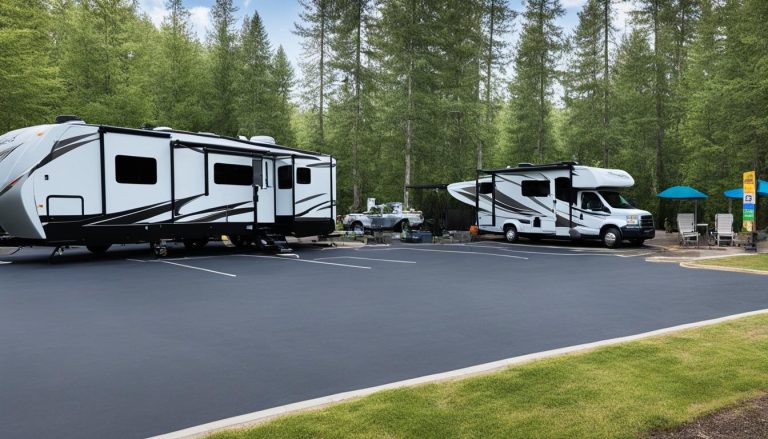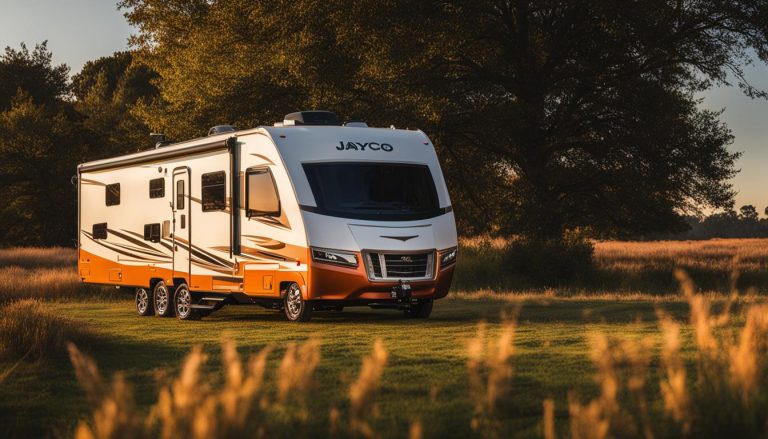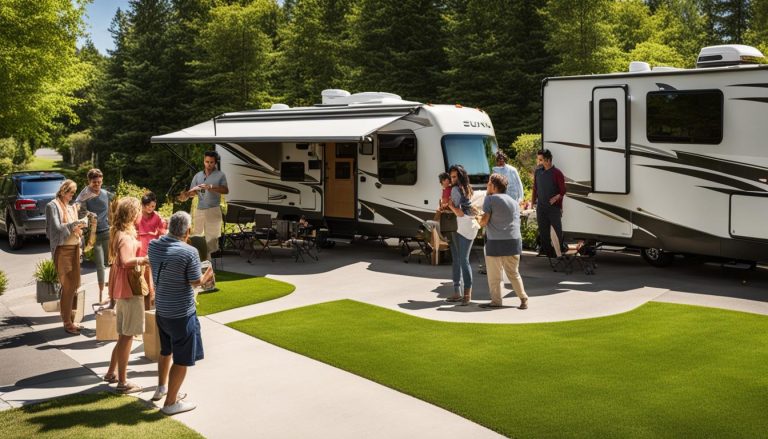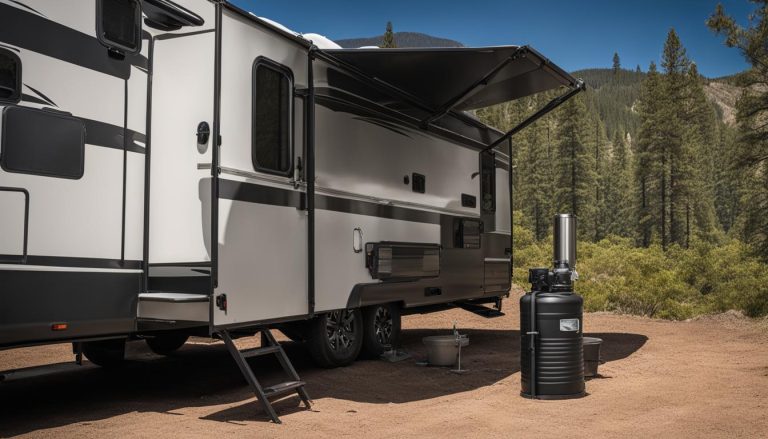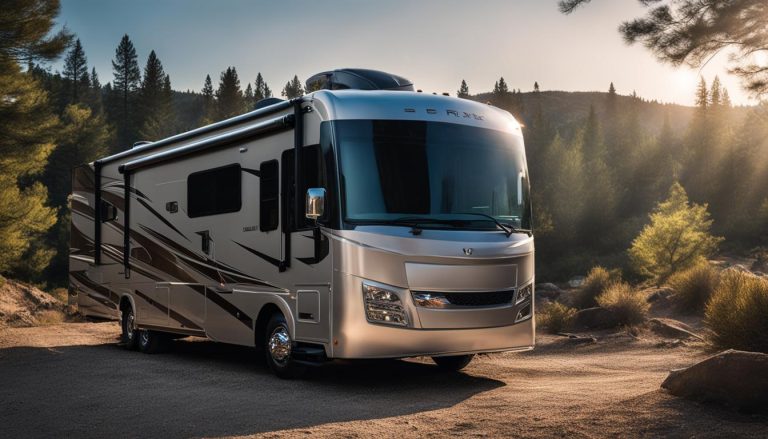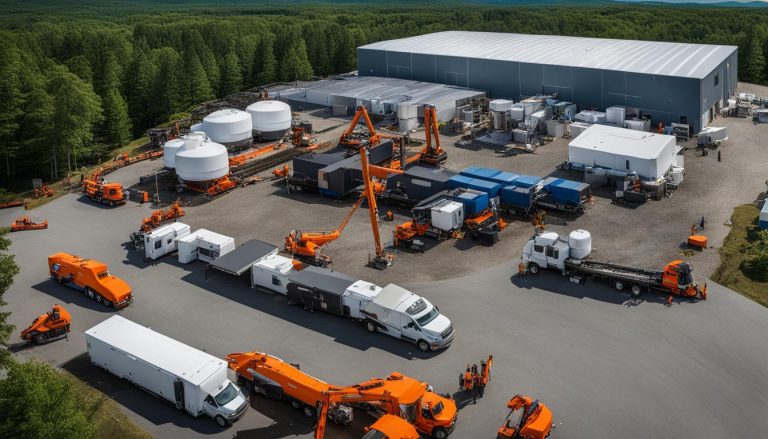Starting an RV Park: Essential Steps and Tips
gorvlifestyle.com and its partners may earn a commission if you purchase a product through one of our links
Starting an RV park can be an exciting and profitable venture for those who love the outdoors and want to provide a memorable camping experience for others. However, it’s important to approach this endeavor with careful planning and strategizing to ensure success. In this guide, we will discuss the essential steps and tips to help you start your own RV park business.
Key Takeaways:
- Research the recreational vehicle industry and identify your target market preferences.
- Create a comprehensive business plan that includes financial projections and competitive analysis.
- Acquire suitable land, obtain necessary permits, and secure adequate insurance coverage.
- Develop the RV park with appealing amenities to attract guests.
- Implement effective marketing strategies to promote your RV park and increase visibility.
By following these essential steps and incorporating the right amenities, you can create a thriving RV park business that caters to camping enthusiasts and road travelers, providing them with an unforgettable experience.
The Difference Between RV and Mobile Home Parks
RV parks and mobile home parks may sound similar, but they have distinct differences in terms of development and business plans.
RV parks are specifically designed for short-term stays and cater to camping enthusiasts and road travelers. They offer a range of amenities and services to provide convenience and comfort to their guests. RV parks focus on high turnover, with guests typically staying for days or weeks. These parks are ideal for travelers seeking a temporary home away from home during their road trips or vacations.
Mobile home parks, on the other hand, are designed for long-term tenancy. These parks provide ground leases to tenants, allowing them to develop and personalize their own plots, creating a sense of permanence. Mobile home parks offer stability and a more permanent living solution for individuals or families seeking affordable housing options. Tenants in mobile home parks often stay for months or even years, creating a close-knit community within the park.
Understanding the difference between RV parks and mobile home parks is crucial for proper development and operational planning. It determines the type of amenities, services, and leasing agreements necessary for each park to thrive. Whether you’re considering investing in an RV park or a mobile home park, understanding these distinctions will help you tailor your approach to meet the needs and expectations of your target audience.
Research and Business Planning
Researching the recreational vehicle industry and creating a comprehensive business plan are crucial steps in starting your RV park. Conducting thorough market research and analysis will help you understand industry trends, target market preferences, and the competitive landscape. This information will guide your decisions and help you position your RV park as a unique and attractive choice for potential guests.
Developing a detailed business plan is also essential for securing funding and demonstrating the profitability potential of your RV park venture. Including financial projections, competitive analysis, RV industry statistics, and tenant leasing agreements in your business plan will provide a solid foundation for success.
Thorough Market Research and Analysis
Before diving into the RV park business, it’s important to conduct thorough market research and analysis to gain a comprehensive understanding of the industry. Here are some key aspects to explore:
- Current demand and trends in the RV park market
- Demographics and preferences of your target market
- Competitor analysis to identify gaps and opportunities
- Pricing strategies of existing RV parks in your area
- Identifying any unique selling points or amenities that can set your park apart
Gathering this information will help you make informed decisions regarding the location, design, and amenities of your RV park, ensuring it aligns with the needs and preferences of your target market.
Creating a Comprehensive Business Plan
A well-structured business plan is essential for attracting potential investors and securing funding for your RV park. Here are some key components to include:
- Executive Summary: A concise overview of your RV park business, highlighting its unique features and potential.
- Market Analysis: Detailed research findings on the recreational vehicle industry, target market, and competition.
- Financial Projections: Revenue projections, expenses, and return on investment analysis.
- Operational Plan: Detailed information about park operations, management structure, and staffing requirements.
- Marketing Strategy: Plan for attracting and retaining guests, including online marketing, partnerships, and promotions.
- Risk Assessment: Identification and mitigation plans for potential risks and challenges in operating an RV park.
Your business plan should provide clear, concise, and compelling arguments for the profitability and viability of your RV park. Including industry statistics, such as the growth rate of the RV park industry and occupancy rates, can strengthen your case.
By conducting thorough research and creating a comprehensive business plan, you increase your chances of success in the competitive RV park industry. These steps will guide your decision-making and help you attract investors, secure financing, and position your RV park as a top choice for camping enthusiasts.
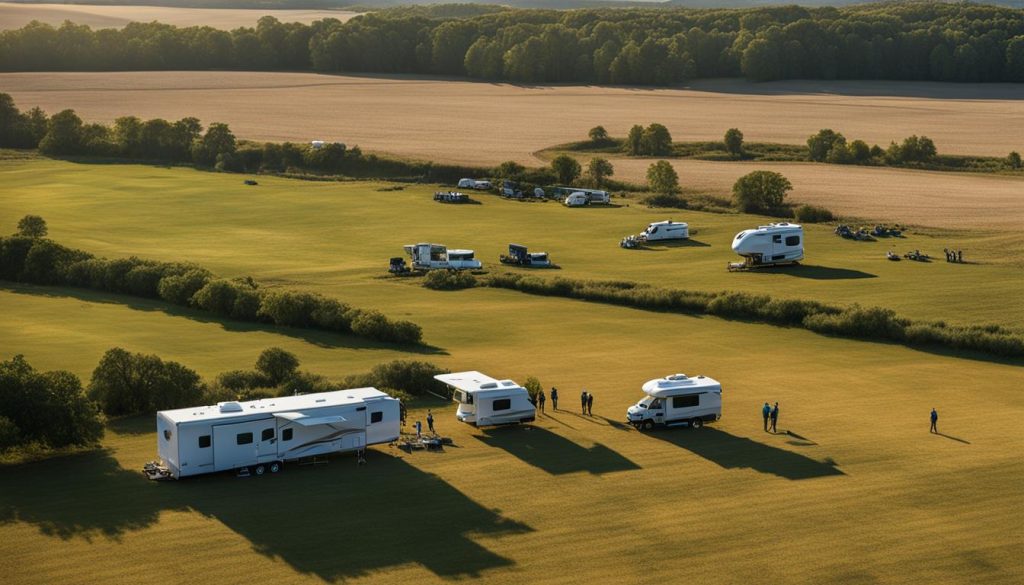
Acquiring Land, Permits, and Insurance
When starting an RV park, one of the crucial steps is acquiring the right land, obtaining the necessary permits, and securing insurance. These three factors form the foundation of your RV park venture, ensuring compliance, protection, and attractiveness to potential guests.
Finding Suitable Land
Acquiring RV park land involves finding a plot that meets your specific needs. Consider factors such as size, location, and amenities to attract guests. Ideally, the land should be easily accessible, with nearby attractions and amenities that enhance the camping experience. Researching the local market and targeting areas with high demand for RV parks can help you make an informed decision.
Obtaining Permits
Once you have selected the land, navigating the permitting process becomes essential. Each jurisdiction has specific regulations and zoning requirements that must be met. Working closely with local authorities and understanding the permit application process will ensure compliance and a smooth development journey for your RV park. It is advisable to engage professionals who specialize in RV park permits to avoid any regulatory setbacks or delays.
Securing Insurance
Insurance coverage is a critical aspect of any RV park business. It safeguards your investment, protects your guests, and mitigates potential risks and liabilities. RV park insurance typically covers areas such as property damage, liability claims, and accidents that may occur on-site. Partnering with reputable insurance providers who understand the unique risks associated with the RV park industry is essential for comprehensive coverage.
“Finding a suitable plot of land, navigating the permitting process, and securing insurance coverage are critical steps in starting an RV park. These steps ensure compliance, protection, and a solid foundation for your business.”
| Benefits of Acquiring RV Park Land | Importance of Obtaining Permits | Advantages of Securing Insurance |
|---|---|---|
|
|
|
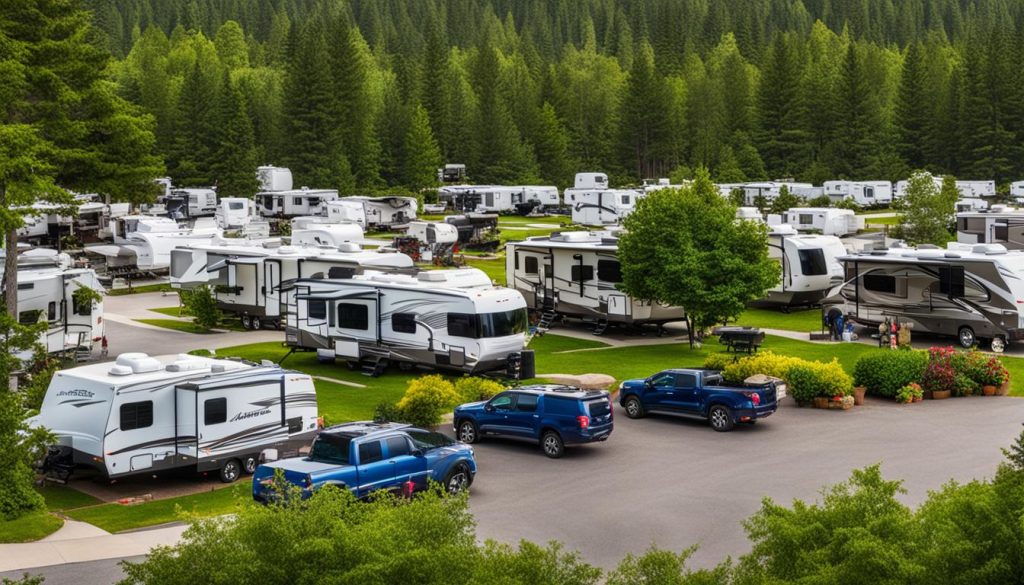
Acquiring RV park land, obtaining the necessary permits, and securing insurance are crucial steps that lay the groundwork for a successful RV park venture. By carefully considering location, adhering to local regulations, and protecting your investment, you can create an attractive and secure environment for guests to enjoy their RV camping experience.
Developing the RV Park and Marketing the Business
Developing an RV park involves transforming your plans into a reality by creating an inviting atmosphere and providing the amenities that will attract and retain guests. The key to success lies in meticulous design and construction. Start by designing and building spacious and well-maintained campsites.
Installing utility hookups such as water, electricity, and sewer connections ensures that your RV park meets the needs of modern campers. But don’t stop there; consider developing additional amenities to enhance the overall experience. Facilities like clean and modern sanitary facilities, a clubhouse for social gatherings, a refreshing pool, a fitness center, or entertainment areas can all make your RV park stand out.
Remember, the more appealing and convenient your amenities, the more likely guests will choose your RV park over the competition. However, even the most incredible RV park requires effective marketing to attract customers. Hiring a dedicated marketing team with experience in the RV industry can help you create impactful strategies that will boost your park’s visibility and reach potential guests.
Implementing online marketing techniques, such as search engine optimization and targeted advertising, can significantly increase your RV park’s online presence. Engage with your audience through social media campaigns and keep them informed about seasonal offers, special events, or exclusive amenities your park offers. Partnering with local tourist attractions can also be an effective way to drive bookings and create mutually beneficial partnerships. With a well-developed park and a strong marketing strategy in place, your RV park business is sure to attract enthusiastic campers and become a sought-after destination.
FAQ
How do I start an RV park?
Starting an RV park involves several essential steps, including researching the industry, developing a business plan, acquiring the right land, obtaining permits, and building the park. It is a complex process that requires careful planning and execution.
What is the difference between RV parks and mobile home parks?
RV parks cater to camping enthusiasts and road travelers, offering amenities to attract new guests. Mobile home parks, on the other hand, focus on long-term tenancy and often allow tenants to develop their own plots. Understanding these differences is crucial for proper development and operational planning.
Why is research and business planning important for starting an RV park?
Researching the recreational vehicle industry and developing a comprehensive business plan are crucial steps in starting an RV park. They help you understand market trends, target market preferences, and the competitive landscape. Additionally, a well-developed business plan is essential for securing funding and demonstrating the profitability potential of your RV park venture.
What are the key steps in acquiring land, permits, and insurance for an RV park?
Acquiring the right land involves finding a suitable plot that meets your needs in terms of size, location, and amenities. Afterward, you must navigate the permitting process to ensure compliance with local regulations and zoning requirements. Finally, obtaining insurance coverage is crucial to protect yourself, your guests, and your investment from potential risks and liabilities.
How do I develop the RV park and market the business?
Developing the RV park involves designing and constructing campsites, installing utility hookups, and developing additional amenities. The more appealing and convenient the amenities, the more likely guests will choose your RV park. Once the park is developed, marketing becomes crucial to attract customers. Hiring a marketing team with experience in the RV industry can help create effective marketing strategies that promote your RV park and reach potential guests.

